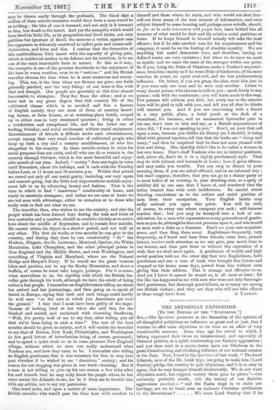THE ABYSSINIAN EXPEDITION.
[To THE EDITOR OF THE "SPECTATOR."] SIR,—The Spectator possesses in the formation of the opinion of all thoughtful politicians an influence so great and so just, that I venture to offer some objections to its view on an affair of very considerable moment. Some time ago the school to which I belong expressed their views on international, and especially of Oriental politics, in a spirit condemning our Eastern aggressions ; and you then read us a severe lesson upon our blindness to tho great Christianizing and civilizing influence of our national mission in the East. Now, I read in the Spectator of last week, "The fossil Liberals, men of the Mr. Lusk type, are going to make him [Lord Stanley] pledge the country to quit Abyssinia, and it is so easy to agree, that he may hamper himself irretrievably. We do not want Abyssinia much, but suppose society there goes to pieces "—(an extremely probable result, vide the history of our Eastern aggressions passim) —6‘ and the Pasha steps in to claim our leavings, are we to hand over an inchoate Christian civilization to the Mussulman 9 We warn Lord Stanley that if he
yields he will take the very heart out of the Indians, who hate surrendering anything, from Pekin to Boota.n." The view which we take and that of the Spectator on these questions, much as we have of common ground elsewhere, is distinctly that of implacable antagonism, and as I differ from you utterly, I will with your candid permission say plainly, that whether from a materialist philosophy or general indifference to any high Christian aim, the view you express on our Abyssinian war is to my lower sense of justice simply shocking, immoral, cynical, and hypocritical. I am not about to discuss the original pretext for this conquest of another defenceless race, from which you so quietly tear off the mask, but I point only to your reasons for supporting a fresh act of imperial aggrandizement. We do not want Abyssinia much ; but we may want it. What can Russia, Prussia, France, or any other European buccaneer say more wanton ? And then the "inchoate Christian civilization" of King Theodore and his people, which, by the way, dates from the Eunuch.
Has Nicholas or Napoleon ventured on any more cynical bit of piety? And the heart of the old Indians must be kept up by domineering over half armed savages. Has a French colonel or a Confederate partizan uttered anything more ferocious? For my part, I consider nothing is more necessary than to quench the tiger temper of the Indian Zouave from infecting our English policy. To me the first care would be to curb the growth of that Imperial tyranny. But if I were resolved to crush another helpless race, I think I would rather do it without talking of their souls. We all know that to gain a foothold in Abyssinia has long been a project of the British Government, and was even submitted (as papers in the Foreign Office prove) to the opinion of the late Duke of Wellington. We all know that its object is a future attack upon Egypt. No ambition is too vast or wicked for the English aristocracy, pandering to the English merchant. No disclaimers satisfy me in the face of the grand expedition on foot. I should as soon trust the disclaimers of the Moniteur about Rome. But if it must be done, let it be without further degrading the very name of the Gospel. In the mean time I will beg you to distinguish your case from that of the French Colonel of Turcos, who says, "We don't want Rome much. But it may be convenient to break up Italy. And'the Chassepot will make such pretty practice with these Red Shirts. Besides, our Africans must be kept in humour. And then, you know, the Holy Father !"
A religion which sends us to an Abyssinian conquest with such cant upon our lips is as dead as the Temporal Power.—I



































 Previous page
Previous page